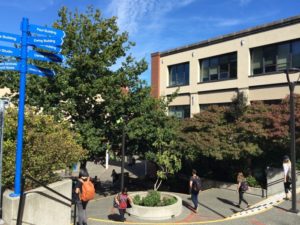Camosun College’s Mental Health, Addictions and Criminal Justice advanced certificate (MHCJ)—a program aiming to bridge the gap between the criminal justice system and those struggling with mental health and addiction issues—is launching in September.
After a pause due to COVID after piloting the program in 2020, program chair and Criminal Justice department instructor Wendy Taylor looks forward to picking up where they left off, addressing challenges to better meet community needs and highlighting social responsibility, advocacy, and inter-professional practices.
“The problem we are facing is the lack of community-based resources for those with mental health or addiction challenges,” says Taylor. “Often the justice system is the first to respond when there’s problems in the community or people need help. And often people commit crimes, for example, to support their addiction habit… How do we work to better support them at the community-level is the challenge. So often resources in the justice system are relied upon.”

Taylor says the program’s perspective looks to decentralize the criminal-justice system to open up new avenues for assistance and decrease mental-illness- and addiction-rooted incarceration.
“[We are] very much focused on prevention and looking at what we can do to reduce the number of individuals in our justice system with mental-health and addiction challenges very much over-represented in the system,” she says, “and really looking for ways we can work together to get them supported at the community level and not through the justice system itself.”
To broaden available resources and redirect individuals away from the justice system, the new program emphasizes working as a community to deliver diverse ideas and support systems.
“[F]or our course, it’s about working together, it’s about collaborative practice,” she says. “So everything that we learn is to understand the work that each of us do and…the challenges we face and the opportunities we have, and then how do we best do it together?”
The MHCJ program educates individuals working in the mental-health field, such as police officers, probation officers, outreach workers, addiction workers, health workers, and community service workers. Taylor says operating in an inter-professional environment allows students to learn from each other as well as from an advanced curriculum to benefit their occupations.
“[Students] get… the certification that they have a higher level of understanding of mental-health-, addictions-, and justice-related issues to this area. And they also have the experience of working on projects and research and knowledge,” says Taylor. “So I do think it helps them in their current employment or has credentials to help them to work in this area.”
The eight-course program is available to be taken online—students in the course meet virtually as a class with speakers and experts once every two weeks to discuss the curriculum and share as a group, an important part of the MHCJ.
“The curriculum has an understanding of the issues, understanding what works, challenges, best practices, research, then looks at opportunities and challenges in communities,” Taylor says, “then the last course is a capstone where working in teams and together, they identify challenges and their communities and come up with a project to address them.”
Taylor says she views the justice system as a partnership with community-based care.
“[W]e all work together. And I think what we’re trying to really move forward on is how do we best support people with mental-health and addiction challenges, and how do we better support them together? So, maybe the police might be called to a house, for example, first. But now we’re seeing the police coming up, cars that have a mental-health worker and a police officer working together,” she says. “We’re seeing some really positive changes happening.”
